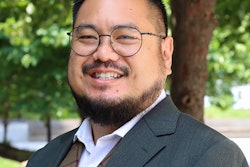Title: Assistant Professor, Division of Higher Education, Iowa State University
Age: 37
Education: B.A., psychology, Ohio State University; M.A., higher education & student affairs, Ohio State University; M.LHR, human resource management, Ohio State University; and Ph.D., counseling & student personnel services, University of Georgia
Career mentors: Dr. Chris Linder, University of Utah; Dr. Stephen John Quaye, Ohio State University; Dr. Darris Means, University of Pittsburgh; Dr. Cynthia Dillard, Seattle University; and Dr. Christa Porter, Kent State University
Words of wisdom/advice for new faculty members: “Do the work that inspires you. Do the work that makes you smile, brings you joy. It’s important that you don’t sacrifice your values and your beliefs, thinking you might do something different once you have tenure.”
Dr. Terah “TJ” Stewart is no stranger to studying marginalized populations. As a former multicultural center assistant director at The Ohio State University, his work was rooted in equity and justice. Heading into his doctoral program, that focus didn’t change all that much. He dove even deeper into the research.
“When I started my doctoral work, what I started to sort of realize is, even as someone who had a really strong awareness of equity and justice and all the various different issues, there were still people in groups, in concepts that were missing,” Stewart says. “When we talk about things like ‘in the margins,’. . . racially minoritized people, maybe sexually minoritized people, issues around classism – there are still issues that are absent from that conversation.”
Stewart, an assistant professor of higher education and student affairs at Iowa State University, describes his research as being about the people, populations, and ideas that are “in the margins of the margins.” That means he investigates often overlooked but “very interesting” topics such as college students doing sex work to pay for their education, fatphobia and sizeism in higher ed, and anti-Blackness from non-Black people of color.
“My research is looking at the ways that minoritized groups also sometimes engage in oppression – this idea that you can be oppressed and also be oppressive,” Stewart says.
The self-described Black feminist focuses on racially and sexually minoritized communities as well as activism and resistance, such as the everyday sort Black women engage in through social media.
Stewart began teaching as a tenure-track assistant professor at Iowa State in August 2019, after going back to school to receive a doctorate in college student counseling and personnel services.
One of his biggest achievements yet in his scholarship is being recognized and honored for his book on college student sex work. For Sex Work on Campus – also available for open access – Stewart received the Outstanding Book Award by the Association for the Study of Higher Education (ASHE).
“I’m not saying we need to recklessly bring all these folks into a spotlight,” Stewart said in a Nov. 1 press release. “I’m saying as an institutional leader, as researchers, as teachers, we have to ask the question: ‘Are these folks in my classroom? And if so, do we care about their needs?’”
Given the niche nature of his work, making it “legible” for audiences and those with influence can prove difficult, which means there are struggles with attaining broader financial support, Stewart says. Interacting and inviting into discussion people who may be reluctant to understand his research can also be taxing, partly due to the current social climate, Stewart says.
“I think, sometimes, I want to seek out the folks who get it because it’s always affirming to have those folks say [they understand],” Stewart says. “And sometimes, it’s really difficult to try to convince someone why a certain person or certain groups of people should be treated as human beings.
“Sometimes, there’s a wall, a lack of willingness to wanting to engage in that. Part of that is connected to a broader sociopolitical moment we find ourselves in – anti-DEI; before that, it was anti-CRT.”
Matters of stigma also surface. People, he says, tend to dismiss the issues of college sex workers and people with larger bodies.
“The work that I do is not always legible as a justice issue,” Stewart says. “So, people will see these folks who either have these experiences or engage in this type of work and will say that’s not something you should be doing. . . I am shining a light on this area to hopefully allow us to think more deeply and critically about groups that we might have hyper-marginalized in some ways.”
Dr. Joan Collier nominated Stewart as an Emerging Scholar, praising his willingness to take more time during his research to collaborate with people and better the product.
“Part of the reason why I wanted to nominate TJ is because I want other scholars who are also coming up through the ranks to understand that your research doesn’t have to be cut and dry, that your research can be bodacious and meaningful, and that when you’re talking and working with groups at the margins, you owe them dignity and respect,” says Collier, assistant vice president for equity and inclusion at Rutgers University.
In a postsecondary environment where junior scholars are rewarded to produce work and research at a fast pace, Stewart’s approach should be commended, Collier says.
“TJ is a star in higher education,” says Collier, adding that Stewart is deeply committed to his research, which shows in how he moves through life. “Not every phenomenal scholar is a phenomenal person,” she adds.















